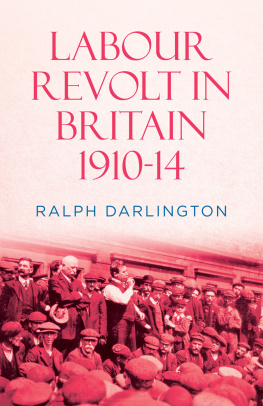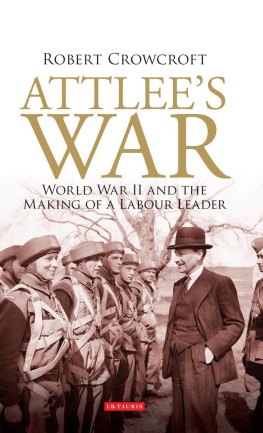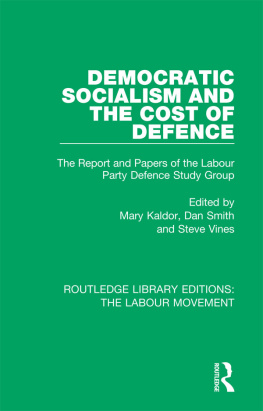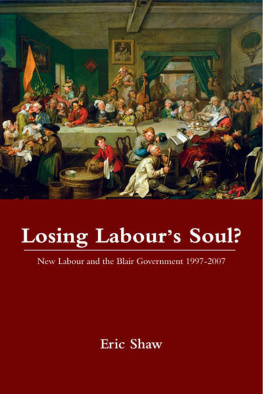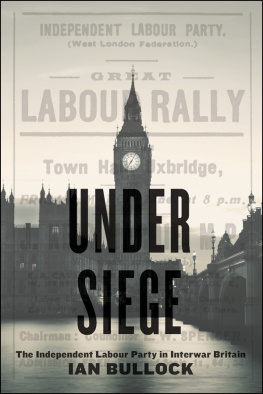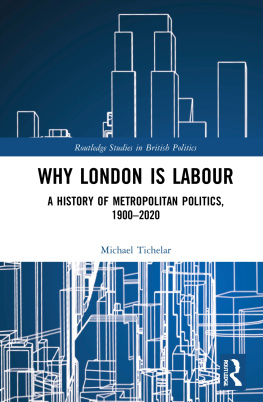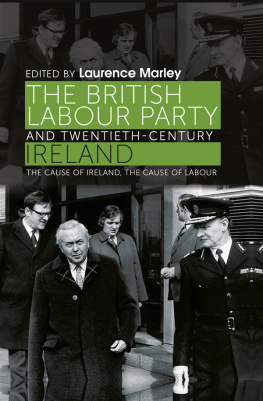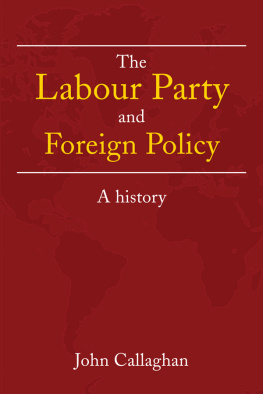Speak for Britain!
A New History of the
Labour Party
MA RTIN PUGH

This eBook is copyright material and must not be copied, reproduced, transferred, distributed, leased, licensed or publicly performed or used in any way except as specifically permitted in writing by the publishers, as allowed under the terms and conditions under which it was purchased or as strictly permitted by applicable copyright law. Any unauthorised distribution or use of this text may be a direct infringement of the authors and publishers rights and those responsible may be liable in law accordingly.
Version 1.0
Epub ISBN 9781407051550
www.randomhouse.co.uk
Published by The Bodley Head 2010
2468 1097531
Copyright Martin Pugh 2010
Martin Pugh has asserted his right under the Copyright, Designs and Patents Act 1988 to be identified as the author of this work
This book is sold subject to the condition that it shall not, by way of trade or otherwise, be lent, resold, hired out, or otherwise circulated without the publishers prior consent in any form of binding or cover other than that in which it is published and without a similar condition, including this condition, being imposed on the subsequent purchaser
First published in Great Britain in 2010 by The Bodley Head Random House, 20 Vauxhall Bridge Road, London sw1v 2sa
www.rbooks.co.uk
Addresses for companies within the Random House Group Limited can be found at: www.randomhouse.co.uk/offices.htm
The Random House Group Limited Reg. No. 954009
A CIP catalogue record for this book is available from the British Library
ISBN 9781847920089
The Random House Group Limited supports The Forest Stewardship Council (FSC), the leading international forest certification organisation. All our titles that are printed on Greenpeace approved FSC certified paper carry the FSC logo. Our paper procurement policy can be found at www.rbooks.co.uk/environment

Typeset by Palimpsest Book Production Limited, Grangemouth, Stirlingshire
Printed and bound in Great Britain by Clays Ltd, St Ives plc
Contents
For
Fran, Hannah and Alastair
BY THE SAME AUTHOR
Electoral Reform in War and Peace 19061918
The Making of Modern British Politics 18671945
The Tories and the People 18801935
Lloyd George
Women and the Womens Movement in Britain 19141959
State and Society: British Political and Social History 18702007
Storia Della Gran Bretagna 17891990
(Britain since 1789: A Concise History)
The March of the Women:
A Revisionist Analysis of the Campaign for Womens Suffrage, 18661914
A Companion to Modern European History 18711945
(editor)
The Pankhursts:
The History of One Radical Family
Hurrah for the Blackshirts!:
Fascists and Fascism in Britain between the Wars
We Danced All Night:
A Social History of Britain between the Wars
Preface and Acknowledgements
Readers and reviewers of this book should be aware that it is neither an heroic nor an in-house account; it is not an attempt to debate the current dilemmas of the Labour Party (though it may throw some light on them) or to predict the outcome of the 2010 general election and its consequences; nor is it intended as a history of Labour governments (though it naturally takes account of the activities of governments to the extent that they have impacted on the party). It is an attempt to analyse the evolution of the Labour Party since its origins in the late Victorian period with a view to explaining its development from a modest sectional party to a major national one. Until relatively recently it was difficult to write a rounded history of the party because the primary material was heavily biased towards national politics and national leaders. Now the availability of the records of many constituency Labour parties has corrected the problem and altered the picture. For example, the split between Bevanites and Gaitskellites, which appeared to dominate national politics in the 1950s, was scarcely reflected at local level. The suspension of electoral activity under the party truce during the Second World War, when the Labour leaders became deeply involved in the Churchill coalition government, made only a marginal impact in the constituencies where the party maintained a remarkable level of activity in preparation for its sweeping success in 1945; Labours parliamentary leaders had so little idea what was happening in the country that their victory took them by surprise.
On the other hand, despite being a history of the party, the book does not neglect or minimise the role of leadership. Indeed, an historical perspective suggests that Labours perennial problems with leadership have been a significant impediment to its success. Basically the party tends to pick the wrong leaders and, in complete contrast to the Conservatives, tends to retain them when they are well past their sell-by date. Like all political movements Labour celebrates its heroes and demonises its villains, but dispassionate historians are not obliged to follow suit. At the partys conference at Manchester in 2008 delegates were treated to presentations about four famous Labour figures, several of which were grotesque misrepresentations; Fiona McTaggart MP reconstructed Barbara Castle as a feminist pioneer though she devoted most of her long career to avoiding feminism, while David Blunkett claimed that Tony Blair and Gordon Brown are both proud to be Bevanites. The present volume takes a more realistic look at the personalities. This means, for example, that Clement Attlee, who has been given an easy ride by most historians because of his undoubted achievements as prime minister, is exposed as an inadequate party leader who was lucky to be at the top in 1945, largely threw it away by 1951, and hung on until 1955 when he had nothing to contribute. Conversely, while by no means overlooking the shortcomings of the much-reviled Ramsay MacDonald, both as an executive figure and as a party manager, the book recognises his achievement as Labours outstanding strategist and public voice in the early decades.
Readers who study the notes may be surprised to see that in addition to constituency material, the national party records, party publications and the papers of leading Labour politicians, including recent leaders such as Michael Foot and Neil Kinnock, I have made use of the papers of some non-Labour politicians. The explanation for this is partly that I have indirectly been studying the subject since I researched my PhD thesis nearly forty years ago and have accumulated a wide range of relevant material on modern British political history. But there is a more deliberate calculation too. Many studies suffer from being confined to what appear to be immediately relevant sources, which is understandable as the primary sources for modern history are simply enormous. However, this narrows the perspective, inhibits the range of questions posed and sometimes makes the answers inevitable. Yet it is scarcely possible to understand any one political movement and to explain satisfactorily its failures and successes without understanding its relationship with other contemporary movements and causes. For example, my previous work on the womens suffrage movement reflected its interactions with the political parties and other issues by contrast with narrowly defined studies whose conclusions tend to be limited and predictable. I was more explicit in writing about fascism in interwar Britain. This is a subject traditionally treated as a distinctly self-contained phenomenon, indeed as having little connection with proper British history. But by moving beyond the small fascist organisations to understand how extensively the arguments and personnel of fascism reflected wider political debates and overlapped with other organisations, I was able to place the phenomenon in a wider and more credible perspective. In the same spirit I have deliberately tried to avoid writing a history of the Labour Party in a vacuum. I do not think its long-term evolution, character and success can adequately be explained except by examining the interactions and common ground with other movements, and by this I do not mean the endless friction with the Communists and the ILP in the 1920s and 1930s, but the relationship between Labour and socialist politics, on the one hand, and mainstream Liberalism and mainstream Conservatism, on the other, which has been a central feature from the late Victorian era to the present day. The three parties react to similar trends, exchange personnel and embrace common ideas despite expressing them in different languages. This approach militates against the heroic style of history, but I hope that by taking a different perspective it is possible to offer a more interesting and credible explanation for the remarkable political phenomenon that is the British Labour Party.





